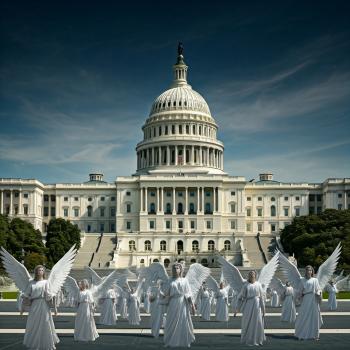It's possible that I'm taking Tom Friedman out of context here. I hope so. I can't say for sure because his NY Times column is now only available via subscription and I am not a member of the "select."
So I hope that, somehow, the surrounding paragraphs qualify and mitigate against what Friedman seems to be saying in the one horrific paragraph I was able to read for free thanks to Atrios:
That will become clear in the next few months as we see just what kind of minority the Sunnis in Iraq intend to be. If they come around, a decent outcome in Iraq is still possible, and we should stay to help build it. If they won't, then we are wasting our time. We should arm the Shiites and Kurds and leave the Sunnis of Iraq to reap the wind.
Friedman here offers as a suggestion — a moral imperative even, "we should …" — the nightmare scenario that I've long dreaded would be the result of the American adventure in Iraq. This is the Rwanda Scenario, and Friedman here seems almost to be quoting from Hutu Power radio, calling for the cutting of the tall trees.
The situations in Rwanda and Iraq have many parallels. Both countries were, for decades, ruled by a privileged minority group which was bolstered by support from the former colonial powers. In Rwanda it was the Tutsis; in Iraq, the Sunnis. Both countries emerged from this minority-rule into something like democracy, but without guarantees protecting the rights of minorities. The situation in Iraq today is thus similar to that in Rwanda in the late 1980s — fertile ground for mass retribution by the formerly oppressed majority.
The supposed "ethnic" divisions in Rwanda were imaginary — "Hutu" and "Tutsi" were colonial inventions, an arbitrary way to divide the subjugated people — but their effects were real. The religious divisions in Iraq are not imaginary. They are older and run deeper than the disastrous Belgian invention segregating Rwandans by height and skin tone. The situation in Iraq, therefore, may be even more of a tinderbox than Rwanda was before President Habyarimana's plane was shot down.
And here is Tom Friedman, advocating shipments of machetes for the Shiite interahamwe.
"Civil war" is too civil a term for what could follow. We're talking Baghdad as Kigali. Basra as Srbenica. Friedman seems to be all for it.
Talk of the potential for civil war in Iraq assumes that such a conflict has not already started. If such a civil war began today, how could we tell? We shouldn't expect neat columns of gray-clad Sunnis marching against fortifications defended by blue-uniformed Shiites. Such a conflict would be asymmetrical — car-bombs, guerrilla attacks, assassinations and bodies found floating in the Tigris. Isn't all that already happening?
That paragraph from Friedman ends with a botched quote from the prophet Hosea. This is not a minor point. Here is the passage (Hosea 8:7) that Friedman garbles:
"For they have sown the wind, and they shall reap the whirlwind: it hath no stalk; the bud shall yield no meal: if so be it yield, the strangers shall swallow it up."
Unless something changes, that may well come to describe the end result of the American adventure in Iraq.
















